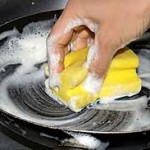Good home hygiene habits are essential and regular cleaning and ‘targeted disinfection’ of all surfaces that are regularly touched such as door handles, taps, switches and bin lids can help to reduce the spread of germs around the home.
As hands are the main route of transmission of germs, thorough hand washing with soap and water at key times is essential to help prevent food borne illness at home.
Dr. Chuck Gerba, professor of microbiology at the University of Arizona, studies how diseases are transferred through the environment.
This involves swabbing household items to measure up bacterial contamination particularly Escherichia coli and staphylococcus aureus.
His studies have found that on the average toilet seat there are 50 bacteria per square inch while there are about 10 million bacteria per square inch on a sponge, and a million on a dishcloth.
It may come as a surprise among us but the kitchen sponge is one of the dirtiest places in the home, 200,000 times dirtier than a toilet seat.
Professor Hugh Pennington, one of Britain’s leading microbiologists, agreed the kitchen and in particular the sponge was among the dirtiest places in the home.
It is not just harmless bacteria lurking on your cleaning cloths and utensils but experts have linked germs found on sponges, cloths and chopping boards with a bacteria that cause home born illnesses.
Hence, it is advised that kitchen sponges and dish cloths should be washed above 60 degree Celsius to kill germs or they should be disinfected regularly while some experts recommend microwaving dish cloths and sponges to kill germs instantly.
Clean and disinfect the kitchen work surfaces and chopping boards with antibacterial sprays and wipes or use disposable antibacterial wipes to discourage the spread of bacteria.
Prof. Pennington said one of the biggest targets for the Health Protection Agency was a bacteria called campylobacter, which can cause paralysis and is commonly found on kitchen sponges.
‘It can cause something called Guillain-Barre syndrome. ‘It doesn’t affect your thinking or feeling, but it can spread to the peripheral nerves around the brain and effect movement.’
Fecal matter can be found on just over a quarter of our hands, new research suggests. In some cases the quantity of germs is equivalent to the number in a dirty toilet bowl.
“These numbers of bacteria, particularly for E.coli, are huge,” according to John Oxford, professor of virology at the University of London.
“E.coli is an indicator bacterium. It may not itself cause horrible disease, but it indicates feces is around and that might contain other organisms like salmonella and shigella which really are virulently pathogenic.”
But we all touch these perhaps startlingly dirty things every day, and on the whole we don’t get constantly ill.
“We’re jolly lucky that as we’ve evolved over two million years, we have a whole set of genes whose only function is to get the immune system in action,” says Oxford.
